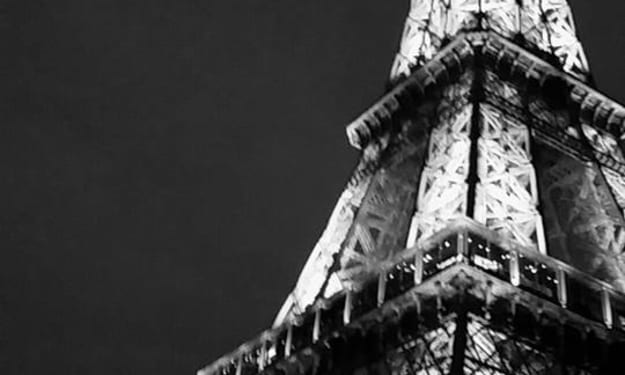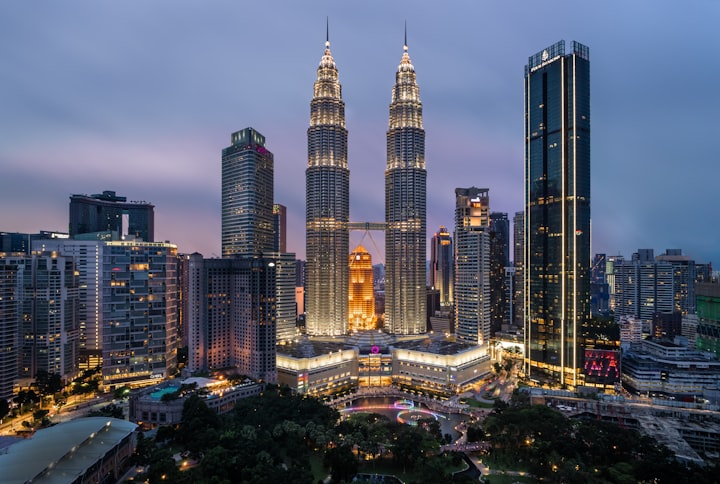Wearing a Hijab in London
The Tale of a Bond Formed Abroad

The train was red and blue; the seats were made of some kind of orange faux leather, and it was sticky to the touch. After discovering the sticky bit, I chose to stand. It was Wednesday midafternoon and a rare English heatwave had struck up, so the train smelled heavily of foreign spices, cumin and turmeric, and of body odor. This train was different than all the trains I had been on in London thus far. Long gone was the sleek look of the underground, the air conditioned cars, the intercom that had worked. This was one of the above ground trains to the outskirts of the city. This was the train to Little Bangladesh.
We had flown to London just a short few days before. I was on a college trip to Europe that was to last the entire summer. I had worked two jobs for a whole year to pay for this trip, all while going to school. One was waiting and bussing tables at a restaurant on the weekends. I learned to smoke cigarettes during this period because that’s how a girl got a break from the endless barrage of work that was 12 hour shifts and poor tipping days. The other job was during the week, and I was a caregiver to intellectually disabled individuals. Delivering medicine and cleaning all afternoon, all while exchanging conversation was a much more easy going vocation. This was one of the most difficult periods of my life; however the seemingly tangible anticipation I felt at the beginning of May had been worth every hour of work I had out in.
On May 15, a group of seven scared college students, my professor, and I boarded a plane bound for Paris. London was a short trip for my group between France and Italy. We arrived on June 20 and remained until only until July 3. I was attempting to soak up every experience I could before we had to leave and fly over the Italian Alps to land in Venice. The morning prior to this new adventure on the red and blue train, to little Bangladesh, I had went to see the National Gallery in Trafalgar Square. I thought this museum had paled in comparison to the Musee D’orsee, a French museum we had visited a week or so before. So far, I had not chosen to leave the safety of my tour groups; a country girl, barely 19-years-old, from a small town named Honaker, population of a thousand at the most, terrified of the size of Paris and now London. However, this trip, on the red and blue train, I was making alone.
In the beginning, before the plane rides, the boarding passes, and even before I paid my dues to the EF College Tours, I had told my mother and father I was choosing to go abroad for a spell. This was in May of the previous year, of 2014. At first, they were apprehensive, until I explained the trip would end in Rome. A light seemed to turn on in my mother’s eyes as she understood. The tour group I was with would spend an entire day in the Vatican. My Catholic mother had gone on and on about the pilgrimage to the Holy City—and the Pope, my god, the Pope. Distinctly, however, this day’s trip on the red and blue train was not to satisfy the will of my mother, or of any other person. I was on this train to satisfy a need of my own: a need to experience.
At last, after what seemed like an hour but had only been 24 minutes, the train creaked to a shaky halt and I escaped the stuffy car to the street beyond. As if experiencing the fresh air for the first time, I inhaled, and the air was sweet with a scent I did not recognize. The buildings, tall and mostly brick, had signs all written in Arabic. There was graffiti, beautiful and strange, covering whole walls, or the street, or anywhere there was room for it. The effect was beautiful, this meshing to brick and art. I felt as an interloper, my mind recalling the words of a poem I had read on the plane, recalling Ozymandias; I was a traveler from a distant land.
I began to stroll along the side walk, beside a street that was not well kept, until I reached an intersection onto a larger road. There, I halted in amazement, as my eyes landed on the largest open air market I had ever seen. It was loud with the voices of many people speaking all at once, and of music somewhere in the distance. My eyes flitted from stall to stall as I took in the faces of the people; as I took in everything I could from that single location. I began walking through the market, staring into the eyes of fish being butchered right there on the street and at women in beautiful gowns that flowed down to their ankles and men with long beards and friendly faces. I toured through the shops, and bought a bag of samosas, a sweet naan filled with vegetables and spices, fresh from a large kettle fire and I tasted what I thought must have been the most delicious tastes in the whole world.
This is where I saw it, what was to become my new dream. A huge, towering mosque, dark brown with hues in tans and light oranges with a gorgeous door gleaming gold. I knew in that moment I wanted to see in inside of the mosque more than anything; that the beautiful building in front of me had been the goal all along.
As I approached the building, however, my path was blocked by two men. They wore dark outfits and surly expressions. The one to the left of me said in a heavy accent, "Ma’am, I am sorry. You cannot enter the mosque.” Politely, I asked him why I could not, His answer made sense to me, but devastated me nonetheless, “Because Ma’am, your head doesn't have a covering,” and with that they walked back to the front doors and I turned around to leave.
Defeated, I wheeled back around to the market, and began strolling through the stalls again. Suddenly, I view what must have been my saving grace, out of the corner of my eye. There was a brilliant splash of colors, pinks and blues, deep purples and mahoganies. And in the middle of it all, a woman, with dark skin and eyes but greying hair, in a stall, selling hijabs. I approached the stall, and quietly spoke to the woman. I asked her how much the hijabs were, and then offered to pay her more to correctly put the hijab on me. She was curious, and by the tone of her voice, a tad apprehensive, as to why I wanted this, and I explained that I wanted to see the mosque, and how beautiful I thought it was. The woman’s eyes softened, and she began searching through a box filled with her beautiful cloth. Finally, she pulled out a hijab of the deepest blue I had ever seen, a blue so beautiful and so deep it seemed to be impossible it was made of thread.
“Sit,” she spoke to me in a heavy accent but soft voice, and I obeyed, sitting in front of her, criss-cross applesauce, like a child. She began wrapping me in the cloth, as if swaddling me. I felt so young, so naïve in this moment, and the woman’s touch was gentle, her face drawn in a quiet sort of determination. She was content when the hijab was correctly pulled around my face. I stared at myself in her mirror, hanging in the booth, and I felt different, like the acts of this woman had changed me. I asked her to allow me to pay her, but she serenely told me this would be her treat. She turned quickly and put a board sign on a nail on her booth, something in Arabic I could not read. She took my hand, and again I felt small, childlike. She led me back to the golden, looming doors and whisked me through them, into a massive room with a domed ceiling and columns intricate decorated with golden flowers and birds. The top of the dome was painted with a mural I did not recognize, women in hijabs like mine and men with dark beards and books. The chairs were soft, plush in the seat of them but dark wood all around and the whole big room gave off a peaceful, earthy tone, just as the outside color of the building and other accents did.
Irmani, which I learned was my newfound guide’s name, spoke to me softly about the mosque. She spoke softly due to the volume of people in the mosque, which was somewhat surprising to me. She explained this was because the mosque was not only used on Fridays, or Jumaa, which is the Muslim holy day, but it was used all week as sort of a community center as well. She showed me where the prayers were done, the mats tucked away safely. She explained how the Jumaa services usually went. Eventually, after I had been staring at this beauty I had not known I was living without, Irmani took me by the hand once more. This time I felt less like a child, more like an equal, and she leaned to my ear and asked if I had been anywhere around here to eat. I grinned openly at her and said I had not. With that she swept away, the hem of her long skirt kissing the floor as she moved.
The restaurant was a hole in the wall, and Irmani seemed to know everyone in it. The room was painted in beautiful and bright colors, and the whole place smelled of sweetly cooking meat and fresh bread. Irmani spoke then about her life, and I spoke about mine. She told me of her own daughter, Jiniya, beautiful, ambitious, and kind. She spoke about weaving the hijabs, how her mother had taught her how. I was hung up on every word, eating my meal with the appreciative silence of good food and an interesting story being told. Afterward, Irmani simply said she had to return to her booth and pack up for the night. She suggested I go back to the city before it was too dark. She kissed my cheek and gracefully swept away, and I did not see her again. In this moment, the childlike feeling swept over me again and I wished for Irmani’s hand to hold as I walked back to the train. It was the first time the whole day I had felt the apprehension of this part of the city. Needless worry, as I found the platform for the red and blue train quickly. However, standing on the platform I still felt the childish bewilderment in my chest and I realized perhaps it was not fear; instead a deep feeling of loss as I knew I would not see my new friend again.
On the ride home, the air was sickly sweet with the smell of fruit and of perfume and the orange seats were still slightly sticky. I sat anyway. The red light of a sunset filtered over me, and the world seemed quiet, as if everyone were holding their breath at once. The sunset turned to dark, and the train’s inside lights flickered on, I reflected on the day’s events. Truly, I felt miles different now than the me who rode this same train earlier. I thought of Irmani, and the completely different life she had lead than the life I had. And yet, for a brief moment in time, we shared ourselves with each other.
This is one of the particular days in which I became the person I am today; nothing a person would think to deem radical. I did not convert to Islam; I did not uproot my life and move to London. However, this was the day I learned that kindness, and friendship are universal, defiant of language and differences. I believe I now carry that lesson in my heart, and try to be an example of that love, given to me freely from a woman who had nothing to gain but my love back.






Comments
There are no comments for this story
Be the first to respond and start the conversation.